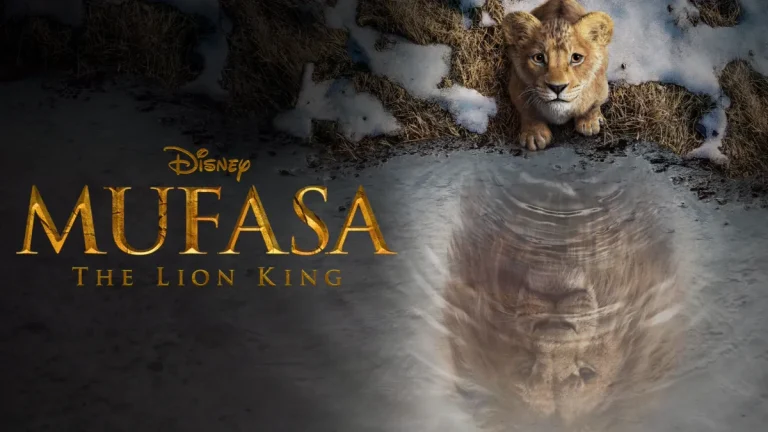The long-awaited holidays evaporated like steam from a boiling kettle, poof! And it’s 2025. To kick off the year, I decided to watch “Mufasa: The Lion King,” as both the 1994 animated version of The Lion King and the 2019 Jon Favreau “live-action” remake have become my all-time favourite movies. Besides, with Barry Jenkins at the helm of the prequel, I was sure that I was in for a fantastic experience to add to the Lion King series.
Boy, was I in for a surprise! As the title suggests, the movie revolves around the rise of Mufasa (Aaron Pierre) from orphan misfit to King and the many trials that he faced along the way. The story is narrated on a stormy night by the wise old mandrill Rafiki (Kagiso Lediga) to Kiara (Blue Ivy Carter) who is left in his care while she awaits her parents, Simba (Donald Glover) and Nala (Beyoncé Knowles-Carter), to return from the birthing grounds with a new sibling. Also listening are the iconic duo, Pumbaa and his meerkat sidekick Timon (Seth Rogen and Billy Eichner), two characters who served as charming comic relief in the previous films, but here, the humour goes on vacation and forgets to pack its punchline. In fact, the only line that actually made any sense was when Pumbaa said, “This story is killing me, I need a bathroom break!” I, for one, could relate to this without hesitation. I remembered them being really funny in the past, but this time around, the humour that once made them memorable felt forced and desperate, like two comedians grasping for laughs in a dying act.
Rafiki goes on to relate how Mufasa, the orphaned cub, stumbles upon Taka (Kelvin Harrison, Jr.), a prince of the Pride Lands who desperately wants a brother. Taka’s mother, Eshe (Thandiwe Newton), takes Mufasa under her wing, teaching him to hunt while her son is restrained from participating by Obasi (Lennie James), Taka’s father. Obasi remains isolated and protective, always suspecting trickery from the outside world. As they grow, Mufasa matures into a confident and compassionate lion, with gifted powers of sense and sight, while Taka struggles to live up to his father’s expectations, which really aren’t that high. That is unless you would consider sleep therapy a weapon of protection. Hence the reason why Taka is the way he is, inexperienced and weak regardless of the royal bloodline that runs through his veins. When a fierce lion named Kiros (Mads Mikkelsen) and his pride attack, Mufasa and Taka escape, seeking refuge with the wise Rafiki and the gentle Sarabi (Tiffany Boone).
And so the search for the mythical land called Milele ensues. Taka falls for the fearless, bold Sarabi, but alas, her heart belongs to Mufasa. Now Mufasa tries his damndest to bring Taka and Sarabi together, but Sarabi will have none of it. This is seen as a betrayal of Mufasa by Taka, and Taka seeks vengeance by joining Kiros in a bid to kill Mufasa—after all, it had been Mufasa that killed the son of Kiros while protecting Eshe. But after all is said and done, Kiros is killed by a falling rock in a well, and Taka is called out for his deception, taking on the name Scar.
While the storyline is good, and it may be captivating for younger audiences, it’s likely to leave adults with a sense of disappointment. From a technical perspective, the lifelike animation of the animals lacked the distinctive personalities and expressions of their predecessors in the 2019 film. Since lions naturally possess limited facial expressions and a uniform appearance, the lion-to-lion interactions made it difficult to follow the narrative and connect with specific characters. The animation isn’t the only problem. The fact is, the quality of every component is a step or two down from its equivalent in The Lion King.
Miranda’s musical songs are undeniably clever and lyrically complex, showcasing his mastery of rhythm and rhyme, however they lack the instantly catchy, karaoke-friendly melodies that defined the iconic Elton John and Tim Rice collaborations. Actually, keywords like “brother” and “bye-bye” are all that remain from the melodies of the movie, not much to sing along to. And as for the voice cast, well, let’s just say that it continues its decline with each iteration. Nyman’s Zazu lacks the comedic timing of his predecessors, while Harrison Jr.’s Scar is vocally inconsistent. It’s also difficult to imagine Pierre’s Mufasa ever maturing into the iconic voice of James Earl Jones, a casting choice as implausible as young Anakin Skywalker becoming Darth Vader.
Despite the potential for exploring themes of love, belonging, responsibility, and the complexities of growing up, “Mufasa” fails to delve into any of them meaningfully. The script remains disappointingly superficial, and the film, despite its visual splendour, lacks a clear purpose or emotional core. Even Lin-Manuel Miranda’s forgettable songs can’t compensate for this fundamental lack of direction. Ultimately, “Mufasa” proves that technical prowess alone cannot save a film devoid of heart and soul.

